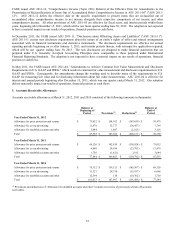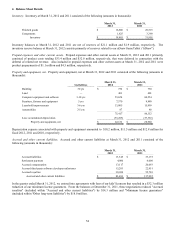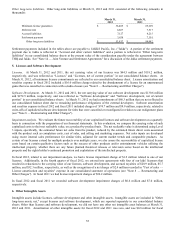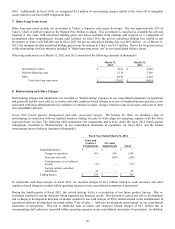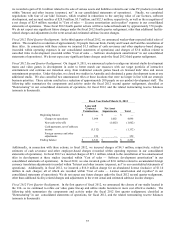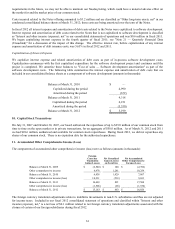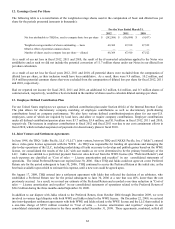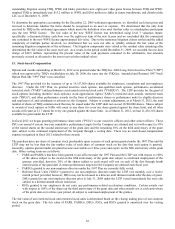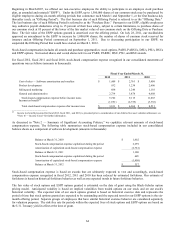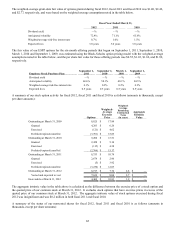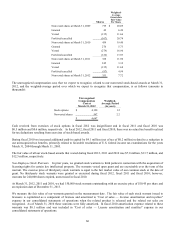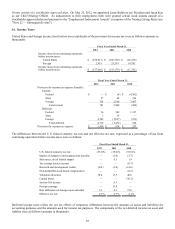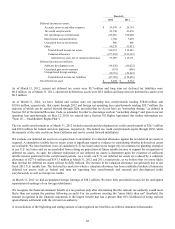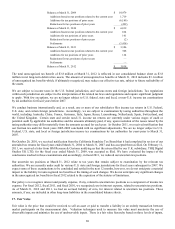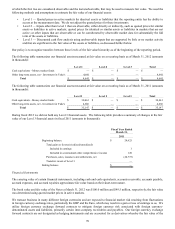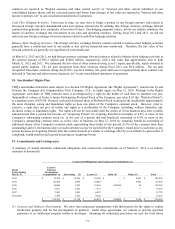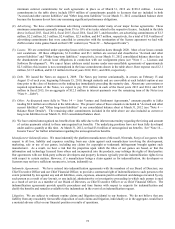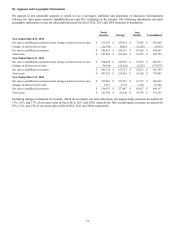THQ 2012 Annual Report Download - page 71
Download and view the complete annual report
Please find page 71 of the 2012 THQ annual report below. You can navigate through the pages in the report by either clicking on the pages listed below, or by using the keyword search tool below to find specific information within the annual report.63
outstanding litigation among THQ, WWE and Jakks; provided a new eight-year video game license between THQ and WWE;
required THQ to immediately pay $13.2 million to WWE and $20.0 million to Jakks in future installments; and dissolved the
LLC as of December 31, 2009.
To determine the appropriate accounting for the December 22, 2009 settlement agreements, we identified each item given and
received to determine whether the items should be recognized as an asset or expense. We determined that the only item
received by THQ in the settlement agreements which meets the definition of an asset that has value to a marketplace participant
was the new WWE license. The fair value of the new WWE license was determined using level 3 valuation inputs;
specifically, a discounted future cash flow over the eight-year term of the new license and we concluded that the contractual
rate contained in the new WWE license approximated fair value. Due to the numerous litigation claims settled and the added
complexity of multiple parties involved, we determined that we were not able to reliably estimate the fair value of the
remaining litigation components of the settlement. The litigation components were valued as the residual value remaining after
determining the fair value of the asset received. As a result, in the period ended December 31, 2009, we recorded the one-time
charge of $29.5 million, representing the present value of the cash payments contained in the settlements, less amounts
previously accrued or allocated to the asset received (the residual value).
15. Stock-based Compensation
Options and awards outstanding at March 31, 2012 were granted under the THQ Inc. 2006 Long-Term Incentive Plan ("LTIP")
which was approved by THQ's stockholders on July 20, 2006, the same day the THQ Inc. Amended and Restated 1997 Stock
Option Plan (the "1997 Plan") was cancelled.
The 1997 Plan provided for the issuance of up to 14,357,500 shares available for employees, consultants and non-employee
directors. Under the 1997 Plan, we granted incentive stock options, non-qualified stock options, performance accelerated
restricted stock ("PARS") and performance accelerated restricted stock units ("PARSUs"). The LTIP provides for the grant of
stock options (including incentive stock options), stock appreciation rights ("SARs"), restricted stock awards, restricted stock
units ("RSUs"), and other performance awards (in the form of performance shares or performance units) to eligible directors
and employees of, and consultants or advisors to, the Company. Subject to certain adjustments, as of March 31, 2012, the total
number of shares of THQ common stock that may be issued under the LTIP shall not exceed 18,500,000 shares. Shares subject
to awards of stock options or SARs will count as one share for every one share granted against the share limit, and all other
awards will count as 2.17 shares for every one granted against the share limit. As of March 31, 2012, we had 11,438,301 shares
available for grant under the LTIP.
In fiscal 2012 we began granting performance share units ("PSUs") to our executive officers and other senior officers. These
PSUs are earned if certain two-year cumulative performance targets for the Company are attained and vest with respect to 50%
of the earned shares on the second anniversary of the grant date and the remaining 50% on the third anniversary of the grant
date, subject to the continued employment of the recipient through a vesting date. There was no stock-based compensation
expense recognized in fiscal 2012 related to these awards.
The purchase price per share of common stock purchasable upon exercise of each option granted under the 1997 Plan and the
LTIP may not be less than the fair market value of such share of common stock on the date that such option is granted.
Generally, options granted under our plans become exercisable over three years and expire on the fifth anniversary of the grant
date. Other vesting terms are as follows:
• PARS and PARSUs that have been granted to our officers under the 1997 Plan and the LTIP vest with respect to 100%
of the shares subject to the award on the fifth anniversary of the grant date subject to continued employment of the
grantee; provided, however, 20% of the shares subject to each award will vest on each of the first through fourth
anniversaries of the grant date if certain performance targets for the Company are attained each fiscal year.
• PARSUs granted to our non-employee directors under the 1997 Plan are currently fully vested.
• Deferred Stock Units ("DSUs") granted to our non-employee directors under the LTIP vest monthly over a twelve
month period; provided, however, DSUs may not be released to a director until thirteen months after the date of grant.
DSUs granted to our non-employee directors prior to July 31, 2008 under the LTIP vested immediately but were also
subject to a thirteen-month release restriction.
• RSUs granted to our employees do not carry any performance-related acceleration conditions. Certain awards vest
with respect to 100% of the shares on the third anniversary of the grant date and other awards vest at each anniversary
of the grant date over a three-year period, all subject to continued employment of the grantee.
The fair value of our restricted stock and restricted stock units is determined based on the closing trading price of our common
stock on the grant date. The fair value of PARS, PARSUs, DSUs, PSUs, and RSUs granted is amortized over the vesting
period.


